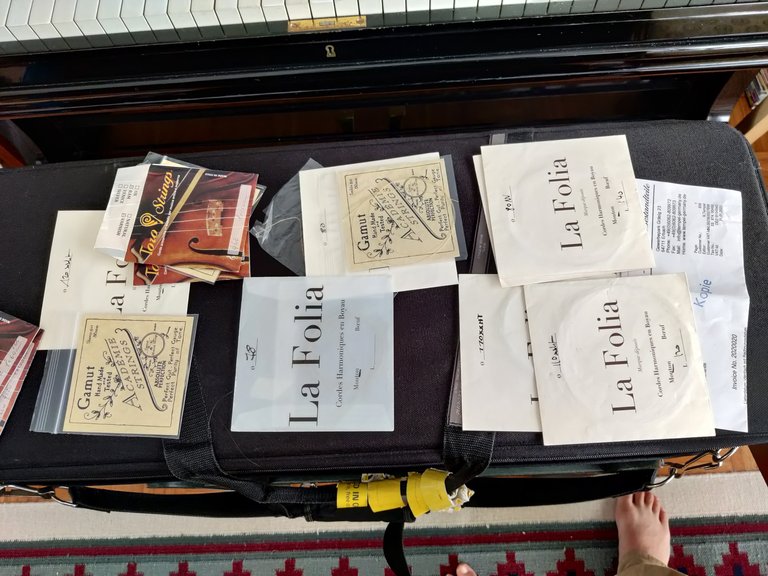
As a string player, I always have sets of strings on reserve on the off chance that I suffer a snapped string and will need to replace the string before I'm able to use the tools of my trade again. Plus, strings will eventually go a bit false as they are stretched on the instrument for a long time. They get a bit brittle and uneven, and they will tend to ring a bit flat and dull in comparison to when they were freshly stretched out. So, even if they aren't broken, they need to be replaced regularly if you want to keep your instruments in peak playing condition.
This problem is even worse for the instruments of my particular specialisation where the strings are made of pure naked gut made from sheep or cow insides. Modern Violin strings are made with steel in comparison, which has much more endurance and resistance to weather changes. However, they do have a very different sound and response.
Unlike modern violin strings, pure gut strings come in many different types... varying in thickness, length, type of twist and coating. Plus, each manufacturer has a very distinct style and choice of raw materials as well! Each instrument will have a certain preference for different combinations of thickness and type which will work best... which is the sort of thing that you settle upon through long experimentation and experience. Of course, to make things more interesting... these things change with the temperature and humidity, as the wood and sinews respond so differently in different weather conditions!
... and the manufacturers make these strings by a mostly manual method... so the quality is more variable from batch to batch in comparison to a factory line!
So, every now and then... I take a quick stocktake of what strings I have. I have 3 violins, 1 viola and a viola dámore that need sets of gut strings. So, a different combination for each instrument... which leads to a nightmare of figuring out what gauges (thickness) and types are required when I do the string order.
Thankfully, this time... I had more than enough Viola dámore strings (which are partially overlapping the violin and viola strings anyway....) so I didn't have that particular nightmare of 14 strings to reorder.
Meanwhile, the violins needed to have the top strings restocked (these are the thinnest strings, so they tend to break more often...).
For the high pitched violins (A = 430/440/466 Hz) I would need thinner strings, 58 and 60 for the E string, 80 for the A string and 110 for the D. The lower pitched violins (A = 415 and 392Hz) have thicker strings at 64/66 for E strings, 86 for the A string and 120 for the D.
The Viola needs a 80 on the top (A) and the D is a 110.... however, I can't use the strings of these gauges from the violins, as they are the wrong length! I also had to order a very rare C strings... these cost quite a bit, but I had managed to snap one recently!
So, a large string order this time... and also a chance to throw out some older reserve strings that seem to be dated from the last decade. Definitely too brittle to use anymore!


Account banner by jimramones


Do you want to get involved? Do you want to support music and this project? Follow us to keep you updated and read our Introduction post!
Thank you for the support and curation!
Gut strings, I knew those were used. I just assumed it was a thing of the past. Are they expensive?
I guess vegan violinists don’t use them 😅
Gut strings are mostly for the "Oude Muziek" people like me... they aren't too rare, and well... they are comparable in price to steel and metal strings, however, they aren't anywhere near as durable! They are a thing of the past, but they were still used well into the middle of the 20th century!
Yeah i agree about changing strings oftenly, My guitar strings last one to two months, after that one of My strings (D) tends to get broken and i change the entire set, when i don't have enough to Buy strings i tend to take all the juice of My strings, but when the strings are too old Even My mood changes!
I would highlight your post on the hummingbird Best on @adiwathrive today!
Haha that mood thing you mention is soo true! Playing with freshly replaced string is the best feeling 😅
Yes, I often get too lazy and don't change the strings regularly enough. When they first go on, they sound too bright for the steel ones... and the gut ones take several days to stretch into an equilibrium!
Your post has been supported and upvoted from the Classical Music community (Subscribe at peakd and Steempeak) as it appears to be of interest to our community. We also support jazz and folk music posts!
If you enjoy our support of the #classical-music community, please consider a small upvote to help grow the support account!
You can find details about us below.
The classical music community at #classical-music, Peakd, Steempeak and Discord. Follow our community accounts @classical-music and @classical-radio or follow our curation trail (classical-radio) at Hive Vote or SteemAuto!
I still do not play an instrument although i have lots of time to do so. But I listened Albinoni Baroque music a lot recently. (via Youtube and JBL speaker) Probably a popular guy because I like it ;)
Ah, Albinoni is pretty good Baroque music. Most people only know the famous piece... which from memory, might be a fake?
Your balance is below 0.3 HIVE. Your account is running low and should be replenished. Check out the Dustsweeper FAQ here: https://hive.blog/dustsweeper/@dustsweeper/dustsweeper-s-faq
We find your article extremely interesting. Every time we think about strings I think the word "sonority" comes to mind because, depending on the purpose and the sound you want to achieve in the execution or composition, the choice of strings could vary, because as you mentioned, the difference between the sound produced by one type of string and another is evident.
We invite you to be part of our community! The place that encompasses the musical content on Hive. Here you can find everything from music performances to reviews, analysis, and opinion. Be part of this community composed of musicians, producers, and writers who are passionate about music.
Just click on the link, subscribe, and start your journey as a HIVESICIAN: HIVESICIANS Community.
You can also join our Discord Server! Here you can connect more closely with community members and participate in special activities.
Thank you for the support and curation!